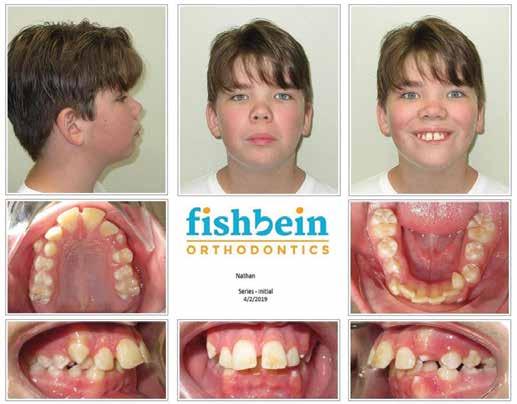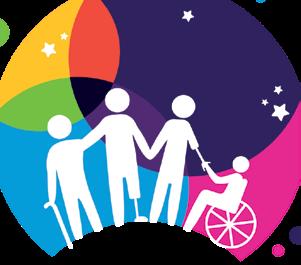
5 minute read
How to Excel When Treating Patients with Special Needs
By Erin Taylor, DMD Treating special needs patients provides a unique and fulfilling opportunity within my practices. Having the opportunity to provide excellent dental care and remove the access barrier is not only rewarding for patients and their families but for the doctors and staff within my practices as well.
I first connected to the treatment of special needs patients during my dental school education at the University of Pittsburgh School of Dental Medicine. Consequently, after graduating from my dental school program, I continued my education as a pediatric dentistry resident at the University of Pittsburgh. I continued to diagnose and treat special needs patients at the University of Pittsburgh where our residency program worked directly with the anesthesia department, so we were able to provide treatment for all individuals regardless of age, disability, medical needs or behavior.
As I branched out into private practice, I realized that only a few dentists were comfortable treating special needs patients of any age. Adult special needs patients were referred to pediatric dentists because we were considered “behavior management specialists” even though there were times that the procedures were no longer within the scope of our specialty.
Adult dentistry can become increasingly challenging and complicated as patients continue to age because they may require endodontic, periodontic, prosthodontic and even surgical procedures within an adult dentistry scope. This can be significantly challenging since few adult specialties have access to sedation procedure or are willing to treat adults with special needs. Special needs patients that we see in our practice include those with Down Syndrome or with a rare genetic condition, patients on the autism spectrum, or those with any array of syndromes. Our patient age range is not limited to children; we see patients of all ages with special needs.
Offering treatment to special needs patients is a rewarding segment of dentistry that many providers can implement with appropriate tools and patience. Most adult patients who are referred to our practice will start their appointment with introductions to the office in the form of a meet and greet visit. This gives us the opportunity to discuss dental history, go over their current medical history, and assess the patient’s behavior or ability to cooperate so we can decide what methods would provide the most effective care.
From there we are able to develop a treatment plan and present it to the parents or caregivers. If a patient can be seen in a standard clinical setting, we set a date and discuss any routine dental prophylaxis or restorative appointments that utilize traditional communicative behavior management techniques. If needed, we also propose nitrous oxide and oxygen inhalation sedation. If sedation is required due to behavior or other medical complexities, then we can have a discussion about the available sedation options. In our practice, we offer IV sedation in conjunction with a dental anesthesiologist, or we can accompany our patients to
an operating room at one of our local hospitals. Make no mistake, there are an abundance of people with special needs who are seen under routine circumstances because of their affable conduct and their ability to maintain a schedule of regimented dental work without preclusion.
I would love to see more practitioners offer these options in their practices. Many providers already possess the tools necessary to improve treatment accessibility to patients with special needs, such as IV sedation with a dental anesthesiologist or M.D. anesthesiologists. I am committed to establishing a team of specialists in my area who are dedicated to assisting with the treatment of our patients with special needs. Access to these additional providers and specialists allows our patients to receive dental care beyond our pediatric dentistry scope of practice.
We share these treatment alternatives with families so they have access to an endodontist, a periodontist and a general dentist who have the tools necessary to sedate patients in their offices. This team approach allows me to provide the most comprehensive dental care available to my patients and their families that would otherwise not be possible as a lone provider. More providers are needed to effectively care for this specific population of patients, and it starts with diligence and the simple desire to provide care. The life-long connections you make with these patients and their families is the ultimate reward.
If you are interested in treating patients with special needs, get involved by taking available continuing education courses and visiting dental schools with special needs clinics. These are both amazing assets for practitioners to get a first look into the field and develop new protocols to effectively diagnose and offer treatment to patients with special needs in the future. Every provider who opens their door and their heart to patients with special needs makes a huge impact, not only in the dental industry, but in their community as a whole!

L to R: Dr. Craig Shepherd, dental anesthesiologist, Dr. Erin Taylor, patient, Tiffany, and her parents attending a dental appointment.
February 24-25, 2023 • West Palm Beach, Fl Expo Center At The South Florida Fairgrounds

THE FLORIDA MISSION OF MERCY
Florida Mission of Mercy (FLA-MOM) is a large-scale, two-day, professional dental clinic that provides care to any patient at no cost, with the goal of serving the underserved and uninsured in Florida — those who would otherwise go without care. With a goal of treating 2,000 patients, FLA-MOM seeks to have a positive impact by providing important access to dental care.
Treatments o ered at FLA-MOM include: cleanings, fillings, extractions, root canals, pediatric dentistry and limited dentures and partials.

YOU CAN MAKE A DIFFERENCE!
Help us provide dental care to those in greatest need. We need the following types of volunteers: dentists, hygienists, dental assistants dental lab technicians physicians, nurses, EMTs medical assessments of health history vital signs glucose testing general community patient and volunteer registration patient escorts interpreters parking attendants and more!
SIGN UP TODAY AT FLAMOM.ORG
Read, Learn and Earn!
Visit floridadental.org/online-ce for this FREE, MEMBERS-ONLY BENEFIT. You will be given the opportunity to review the “Diagnostic Discussion” and its accompanying photos. Answer five multiple choice questions to earn one hour of CE.
Contact FDC Marketing Coordinator Brooke Martin at bmartin@floridadental.org or 800.877.9922.











